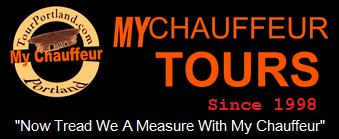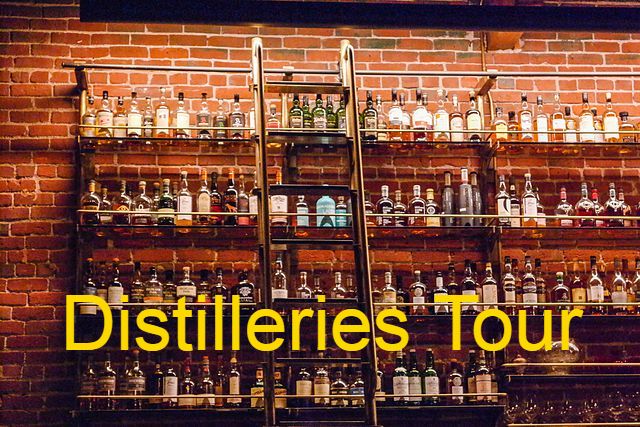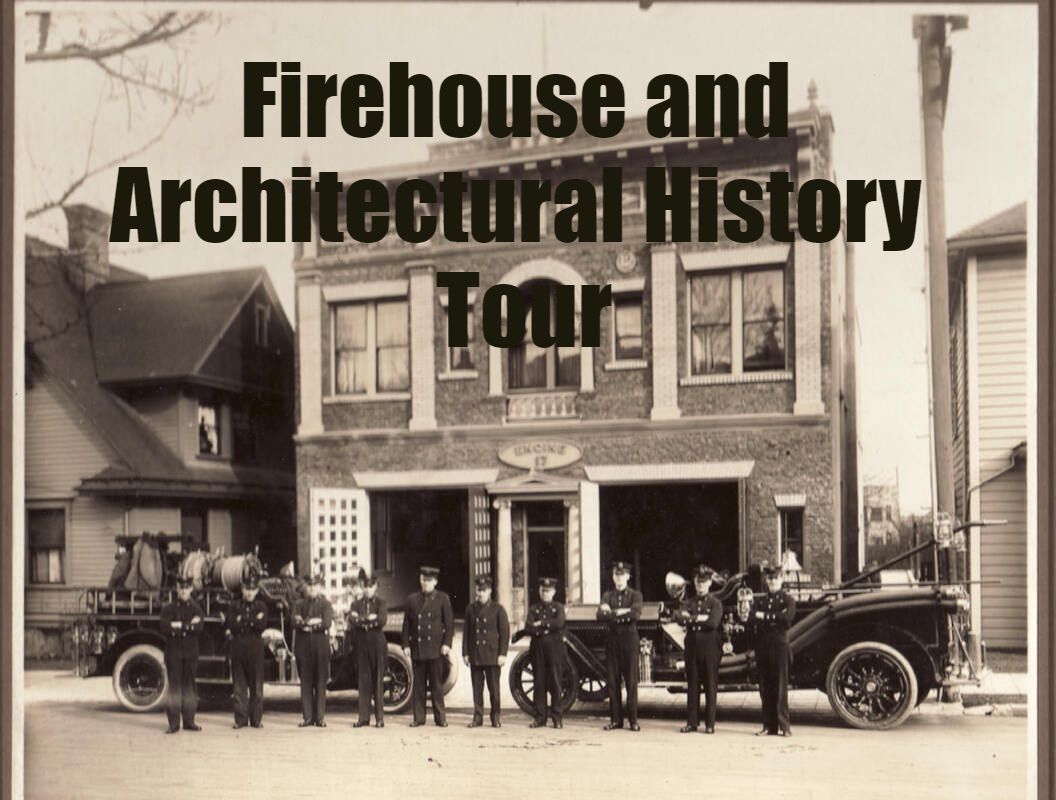The Waldo Building, the big beautiful cast-iron building, in front of us on the corner, to our left, was built in eighteen eighty six...
It is at the heart, of Portland's original Chinatown.
Portland's Chinatown, developed around 1st and 2nd Avenues, and Washington and Alder Streets, an area considered undesirable by European Americans, due to constant flooding from the Willamette River."
A family business in Portland's Chinatown in the early 1900s.
Chinese immigrants had built many thriving businesses in Portland, but by the early 1900s rising xenophobia in the U.S. -- exemplified by the Chinese Expulsion Acts -- was hitting the immigrant community hard.
In Oregon, Chinese residents were prohibited from voting, holding public office, attending public schools, serving on juries, entering professions and becoming naturalized citizens.
A building in Portland's Chinatown in the 1880s.
What makes THE ORIGINAL Chinatown special? Part of it is architectural aesthetics. "The Chinese made alterations to the buildings to reflect their cultural traditions. It was not unusual to see iron balconies, wooden awnings, and curved, brightly-colored canopies over business doorways.
See pictures. Chinatown.
This building, is an example of Victorian Italianate cast iron architecture (with iron pilasters with modified Ionic Capitols) and with two adjacent structures, comprises one of the few full blocks of 19th Century street facades in Portland. It has been used as a residence and for activities by the Chinese community.
It was also the headquarters for a Chinese tong (a secret society often tied to criminal activity). At the time, Portland was home to 4,400 "Celestials", the nations 2nd largest Chinese population.
The Waldo Building basement, contained opium dens, and was used for gambling and other nefarious activities, that flourished here in Portland's original Chinatown.
And Shanghai tunnels to adjacent buildings were used as escape routes...
This famous corner, was also the location of the Snug Harbor Saloon, and Johnson & Sons Undertakers, in the late 1800s. These 2 businesses played a big part at the center of an international investigation, which gave Portland an international reputation, in the shanghaiing trade. More on that famous incident in a little bit.
SEE SLEDESHOW IN PICTURES. Chinatown. Snug Harbor Saloon.
Snug Harbor Saloon, and the ghost of old Bunco Kelly.
Part of an old "Shanghai tunnel" in the basement of Mama Mia's Trattoria, (Waldo Building).
Bunco Kelly
And the famous incident. Dying men with embalming fluid. Narrated now.
By far the most colorful of these crimping (shanghaiing) tales invariably involve a squat; steely-eyed, Scouse Liverpudlian (from Liverpool), named Joseph "Bunco" Kelly.
The Da Vinci of crimping--Kelly's nickname is a testament to his shanghaiing artistry.
Kelly's most famous ruse garnered him-and Portland's waterfront- a rather infamous international reputation.
One somber October night, in 1892, when combing the streets of Portland for 20 men to flesh out the crew of The Flying Prince, Kelly spied an open sidewalk trap-door on 2nd Street and Morrison, right on the corner there.
Upon climbing down a steep ladder, he came across 24 apparently deeply inebriated fellows in a candle-lit cellar, moaning and gasping. The acrid stench of formaldehyde permeating the chamber quickly led Kelly to deduce that these men had mistakenly broken into the basement of what they thought was the Snug Harbor Saloon next door, but was in actuality the cellar of Johnson & Son undertakers. Thinking the cellar was a part of the Snug Harbor Pub; the men had each consumed cups of embalming fluid, which they had mistaken for liquor. When Kelly found them, several had died and others were dying.
Never one to miss an opportunity, Kelly hurried out of the cellar (closing the door behind him to avoid pesky fresh air from reviving his besotted booty) to fetch some goons to help him transport his expiring merchandise. Claiming the dead were merely unconscious from too much drink, Kelly sold all 24 to a captain whose ship sailed before the truth was discovered. The captain, after relaying that he had "never seen so many dead drunks in his life," shelled out $50 each for the 14 corpses and 10 severely ill men Kelly had delivered unto him.
The next day, the first mate of the Prince made the ghastly discovery and the ship proceeded to dock and unload its carrion cargo, causing an international uproar that started an international investigation centering on Portland's crimping practices.
Whether this story is true or not, we do not know. But what we do know, Portland's waterfront had an international reputation for vice and violence.
One of the gems on this block, and of Portland's cast-iron era, is the Grand Stable & Carriage Building, next door.
Built in 1886. It features a classic High Victorian Italianate style.
Visitor's to the city could leave their horses and wagons & hire carriages for "Balls, Opera's, Funerals, Riding, Calling", or to ferry or train depots.
Now, it is renovated, a showpiece, and is on the Historic Register.
Up 1 block, on the left, is The Police Headquarters building. It's completion in 1913, coincided with an era of change for the forces of law and order.
In that year, steps were taken to clean up decades of corruption, and ‘palm-greasing', by the local saloons and gambling, drug, & other nefarious houses.
Next, In 1 minute, we'll see the Railway Exchange Building, and Huber's Restaurant, (eighteen seventy nine, & 1891)
The building was the very 1st, renovated, in 1971, after the era of urban renewal in the 1940s to 1960s, when they tore a lot of the old buildings down, in the so-called "name of progress".
Inside the Exchange Building, is Huber's, Portland's oldest restaurant.
In 1891, Frank Huber hires chef Jim Louie, a 21 year old Chinese Emigrant with a knack for roasting turkey's; a turning point for Huber's, now the longest-running restaurant in town. (Louie even served turkey sandos, to customer's in boats, during the epic eighteen ninety four flood).
The picturesque restaurant is still owned by Louie's descendants, the chef's grand-nephew introduces tableside Spanish coffees, the inventor of the Spanish Coffee fiery spectacle, to the menu in the 1970s.
If you order a pair of Huber's famous Spanish Coffees, the bartender will choreograph your elegant glasses of 151 and Bols triple sec, into a ritualistic fire dance.
It served as a speakeasy during prohibition.
NEXT IS THE SKIDMORE HISTORIC DISTRICT.
With many more.
Does anyone have any questions?
It is at the heart, of Portland's original Chinatown.
Portland's Chinatown, developed around 1st and 2nd Avenues, and Washington and Alder Streets, an area considered undesirable by European Americans, due to constant flooding from the Willamette River."
A family business in Portland's Chinatown in the early 1900s.
Chinese immigrants had built many thriving businesses in Portland, but by the early 1900s rising xenophobia in the U.S. -- exemplified by the Chinese Expulsion Acts -- was hitting the immigrant community hard.
In Oregon, Chinese residents were prohibited from voting, holding public office, attending public schools, serving on juries, entering professions and becoming naturalized citizens.
A building in Portland's Chinatown in the 1880s.
What makes THE ORIGINAL Chinatown special? Part of it is architectural aesthetics. "The Chinese made alterations to the buildings to reflect their cultural traditions. It was not unusual to see iron balconies, wooden awnings, and curved, brightly-colored canopies over business doorways.
See pictures. Chinatown.
This building, is an example of Victorian Italianate cast iron architecture (with iron pilasters with modified Ionic Capitols) and with two adjacent structures, comprises one of the few full blocks of 19th Century street facades in Portland. It has been used as a residence and for activities by the Chinese community.
It was also the headquarters for a Chinese tong (a secret society often tied to criminal activity). At the time, Portland was home to 4,400 "Celestials", the nations 2nd largest Chinese population.
The Waldo Building basement, contained opium dens, and was used for gambling and other nefarious activities, that flourished here in Portland's original Chinatown.
And Shanghai tunnels to adjacent buildings were used as escape routes...
This famous corner, was also the location of the Snug Harbor Saloon, and Johnson & Sons Undertakers, in the late 1800s. These 2 businesses played a big part at the center of an international investigation, which gave Portland an international reputation, in the shanghaiing trade. More on that famous incident in a little bit.
SEE SLEDESHOW IN PICTURES. Chinatown. Snug Harbor Saloon.
Snug Harbor Saloon, and the ghost of old Bunco Kelly.
Part of an old "Shanghai tunnel" in the basement of Mama Mia's Trattoria, (Waldo Building).
Bunco Kelly
And the famous incident. Dying men with embalming fluid. Narrated now.
By far the most colorful of these crimping (shanghaiing) tales invariably involve a squat; steely-eyed, Scouse Liverpudlian (from Liverpool), named Joseph "Bunco" Kelly.
The Da Vinci of crimping--Kelly's nickname is a testament to his shanghaiing artistry.
Kelly's most famous ruse garnered him-and Portland's waterfront- a rather infamous international reputation.
One somber October night, in 1892, when combing the streets of Portland for 20 men to flesh out the crew of The Flying Prince, Kelly spied an open sidewalk trap-door on 2nd Street and Morrison, right on the corner there.
Upon climbing down a steep ladder, he came across 24 apparently deeply inebriated fellows in a candle-lit cellar, moaning and gasping. The acrid stench of formaldehyde permeating the chamber quickly led Kelly to deduce that these men had mistakenly broken into the basement of what they thought was the Snug Harbor Saloon next door, but was in actuality the cellar of Johnson & Son undertakers. Thinking the cellar was a part of the Snug Harbor Pub; the men had each consumed cups of embalming fluid, which they had mistaken for liquor. When Kelly found them, several had died and others were dying.
Never one to miss an opportunity, Kelly hurried out of the cellar (closing the door behind him to avoid pesky fresh air from reviving his besotted booty) to fetch some goons to help him transport his expiring merchandise. Claiming the dead were merely unconscious from too much drink, Kelly sold all 24 to a captain whose ship sailed before the truth was discovered. The captain, after relaying that he had "never seen so many dead drunks in his life," shelled out $50 each for the 14 corpses and 10 severely ill men Kelly had delivered unto him.
The next day, the first mate of the Prince made the ghastly discovery and the ship proceeded to dock and unload its carrion cargo, causing an international uproar that started an international investigation centering on Portland's crimping practices.
Whether this story is true or not, we do not know. But what we do know, Portland's waterfront had an international reputation for vice and violence.
One of the gems on this block, and of Portland's cast-iron era, is the Grand Stable & Carriage Building, next door.
Built in 1886. It features a classic High Victorian Italianate style.
Visitor's to the city could leave their horses and wagons & hire carriages for "Balls, Opera's, Funerals, Riding, Calling", or to ferry or train depots.
Now, it is renovated, a showpiece, and is on the Historic Register.
Up 1 block, on the left, is The Police Headquarters building. It's completion in 1913, coincided with an era of change for the forces of law and order.
In that year, steps were taken to clean up decades of corruption, and ‘palm-greasing', by the local saloons and gambling, drug, & other nefarious houses.
Next, In 1 minute, we'll see the Railway Exchange Building, and Huber's Restaurant, (eighteen seventy nine, & 1891)
The building was the very 1st, renovated, in 1971, after the era of urban renewal in the 1940s to 1960s, when they tore a lot of the old buildings down, in the so-called "name of progress".
Inside the Exchange Building, is Huber's, Portland's oldest restaurant.
In 1891, Frank Huber hires chef Jim Louie, a 21 year old Chinese Emigrant with a knack for roasting turkey's; a turning point for Huber's, now the longest-running restaurant in town. (Louie even served turkey sandos, to customer's in boats, during the epic eighteen ninety four flood).
The picturesque restaurant is still owned by Louie's descendants, the chef's grand-nephew introduces tableside Spanish coffees, the inventor of the Spanish Coffee fiery spectacle, to the menu in the 1970s.
If you order a pair of Huber's famous Spanish Coffees, the bartender will choreograph your elegant glasses of 151 and Bols triple sec, into a ritualistic fire dance.
It served as a speakeasy during prohibition.
NEXT IS THE SKIDMORE HISTORIC DISTRICT.
With many more.
Does anyone have any questions?




















